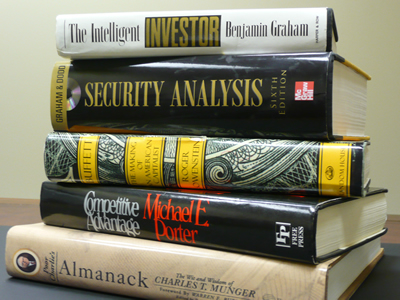Investing Words of Wisdom
What always impresses me is how much better the relaxed, long-term owners of stock do with their portfolios than the traders do with their switching of inventory. The relaxed investor is usually informed and more understanding of essential values; he is more patient and less emotional; he pays smaller capital gains taxes; he does not incur unnecessary brokerage commissions; and he avoids behaving like Cassius by "thinking too much."
Lucien Hooper, Securities Analyst and Forbes Columnist, 1977
...["margin of safety" is] what risk-controlled investing is all about...since we can't predict the future, we never really know when risk control is needed. Risk control is unnecessary in times when losses don't occur, but that doesn't mean it's wrong to have it. The best analogy is to fire insurance: do you consider it a mistake to have paid the premium in a year in which your house didn't burn down?
Howard Marks, Chairman, Oaktree Capital Management, 2014
My biggest mistakes as an investor typically occur when I find myself caught in the vortex of consensus thinking. It doesn't mean that the consensus is always wrong. Contrarianism is not an evergreen strategy. However, I often find that we are most profitable when we enter a strategy with very little company.
Jeffrey Gundlach, CEO, DoubleLine Capital, 2014
Did we ever mention that investing is hard work - painstaking, relentless, and at times confounding? Separating relevant signal from noise can be especially difficult. Endless patience, great discipline, and steely resolve are required. Nothing you do will guarantee success, though you can tilt the odds significantly in your favor by having the right philosophy, mindset, process, team, clients, and culture. Getting those six things right is just about everything.
Seth Klarman, President, Baupost Group, 2016
The number one idea is to view a stock as an ownership of the business [and] to judge the staying quality of the business in terms of its competitive advantage. Look for more value in terms of discounted future cash flow than you're paying for. Move only when you have an advantage. It's very basic.
Charlie Munger, Vice-Chairman, Berkshire Hathaway, 2001
You gain much more by slow investing and concentrating on what you know than on fast investing, which is nothing more than gambling.
Irving Kahn, Chairman Emeritus, Kahn Brothers Group, 2012
It's not during up years that great investment track records are made.
Charles de Vaulx, Portfolio Manager, International Value Advisers, 2008
...we have learned that successful long-term investors stay the course in periods of poor market performance, setting the stage for attractive future returns. Historically, the two key elements of superior equity returns have been valuation discipline and a long-term time horizon.
John Gunn, Chairman, Dodge & Cox, 2010
[An] argument is made that there are just too many question marks about the near future; wouldn't it be better to wait until things clear up a bit? You know the prose: "Maintain buying reserves until current uncertainties are resolved", etc. Before reaching for that crutch, face up to two unpleasant facts: The future is never clear; you pay a very high price in the stock market for a cheery consensus. Uncertainty actually is the friend of the buyer of long-term values.
Warren Buffett, Chairman, Berkshire Hathaway, 1979
Very predictably, as the market goes lower...bearishness goes higher. That's sort of counter-intuitive since the lower stock prices go, the higher the future rate of return. The higher stock prices go, the lower the future rate of return. So people ought to get more bullish if prices go lower, but they don't.
Bill Miller, Chairman, Legg Mason Asset Management, 2010
Leverage works both ways. It magnifies your gains when everything goes well. It magnifies your losses when things don't go well. And, on top of that, value investors should never use borrowing because the second problem with borrowing is that it reduces or eliminates your staying power.
Jean-Marie Eveillard, Senior Advisor, First Eagle Investment Management, 2014
...everyone wants a market prediction. What's the short-term outlook for stocks, interest rates, and so on? And yet, the overwhelming evidence is that such predictions are folly, that there's no predictive value in these short-term forecasts...and yet, the press is filled with reports with new forecasts for the short-term market outlook...People provide forecasts because people are asked to provide forecasts, not because they know what the future holds.
Chris Davis, Portfolio Manager, Davis Advisors, 2015
I never ask if the market is going to go up or down because I don’t know, and besides it doesn’t matter. I search nation after nation for stocks, asking: “Where is the one that is lowest-priced in relation to what I believe it is worth?” Forty years of experience have taught me you can make money without ever knowing which way the market is going.
Sir John Templeton, Founder, Templeton Mutual Funds, 1978

